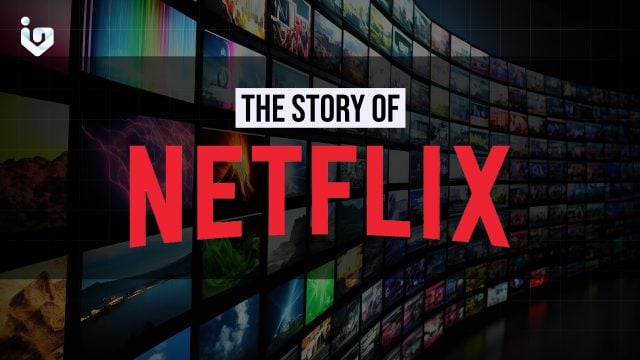Netflix is a company that has revolutionized the way people watch movies and television shows. It started as a mail-based DVD rental service in 1997, and evolved into a streaming platform that offers original content and a personalized recommendation system. How did Netflix achieve such success and growth? Here is a brief overview of its history and milestones.
Launch as a mail-based rental business (1997–2006)
Netflix was founded by Marc Randolph and Reed Hastings, two entrepreneurs who had previously worked at Pure Software, a software company. They came up with the idea of renting DVDs by mail after Hastings was charged a $40 late fee for returning a VHS tape of Apollo 13. They tested the concept by mailing a CD to Randolph’s house, and found that it arrived intact. They decided to launch Netflix as a website that offered a flat-fee unlimited rental model, with no due dates, late fees, or shipping charges. Customers could choose from a catalog of over 900 titles, and receive up to three DVDs at a time. Netflix also introduced a rating system that allowed customers to rate the movies they watched, and receive recommendations based on their preferences.
Netflix faced several challenges in its early years, such as competing with established video rental stores like Blockbuster, and dealing with the high costs of acquiring and distributing DVDs. However, Netflix managed to survive and grow by focusing on customer satisfaction, innovation, and efficiency. It also benefited from the increasing popularity and affordability of DVD players, which boosted the demand for its service. By 2002, Netflix had over one million subscribers, and went public on the NASDAQ stock exchange. By 2005, it had over four million subscribers, and a catalog of over 35,000 titles.
Transition to streaming services (2007–2012)
In 2007, Netflix launched its streaming service, which allowed subscribers to watch movies and TV shows instantly on their computers, or on devices such as game consoles, smart TVs, and Blu-ray players. This was a major shift for the company, as it moved from a physical to a digital distribution model. Netflix also expanded its content library by licensing movies and shows from studios and networks, such as Disney, Paramount, Sony, NBC, and CBS. Netflix also partnered with Starz, a premium cable channel, to offer its subscribers access to more than 1,000 movies and shows, including new releases and exclusives.
Netflix’s streaming service quickly gained popularity, as it offered convenience, variety, and value to its customers. By 2010, Netflix had over 20 million subscribers, and accounted for more than 20% of the Internet traffic in North America. However, Netflix also faced some challenges and controversies, such as increasing competition from other streaming services, such as Hulu and Amazon Prime Video, and rising costs of licensing content from studios and networks, who saw Netflix as a threat to their traditional business models. In 2011, Netflix announced a controversial decision to split its DVD and streaming services into two separate plans, and raise its prices by up to 60%. This caused a backlash from many customers, who felt betrayed and angry. Netflix lost over 800,000 subscribers, and its stock price plummeted by more than 75%. Netflix apologized for its poor communication, and reversed its decision to split its services, but kept its price increase.
Development of original programming (2013–2017)
In 2013, Netflix made a bold move by producing and releasing its own original content, starting with House of Cards, a political drama series starring Kevin Spacey and Robin Wright. The show was a critical and commercial success, and won several awards, including Emmys and Golden Globes. Netflix followed up with more original shows, such as Orange Is the New Black, a comedy-drama series set in a women’s prison, and Stranger Things, a sci-fi horror series set in the 1980s. Netflix also ventured into other genres, such as documentaries, stand-up comedy, animation, and foreign language shows. Netflix also acquired the rights to some existing shows, such as Arrested Development, Black Mirror, and The Crown, and continued their production as Netflix originals.
Netflix’s original content strategy proved to be a game-changer, as it gave the company more control over its content, and more differentiation from its competitors. It also attracted more subscribers, who were drawn to the quality, diversity, and exclusivity of Netflix’s shows. By 2017, Netflix had over 100 million subscribers worldwide, and spent over $6 billion on original content. Netflix also received more recognition and acclaim, as it earned more nominations and awards than any other network or streaming service.
Expansion and diversification (2018–present)
In 2018, Netflix continued to expand and diversify its content and operations, as it faced more competition and challenges in the streaming market. Netflix increased its investment in original content, and produced more than 700 shows and movies, including Roma, a Spanish-language film directed by Alfonso Cuarón, which won three Oscars, and Bird Box, a thriller starring Sandra Bullock, which was watched by over 80 million households in its first month. Netflix also expanded its international presence, and launched more local and regional content, such as Sacred Games, an Indian crime thriller series, and The Witcher, a fantasy series based on a Polish book series. Netflix also experimented with new formats and features, such as interactive shows, such as Black Mirror: Bandersnatch, which allowed viewers to choose their own storylines, and mobile-only plans, which offered cheaper subscriptions for users who only watched on their smartphones.
Netflix also faced some challenges and controversies, such as losing some of its licensed content, such as Friends and The Office, to other streaming services, such as HBO Max and Peacock, and facing more competition from new entrants, such as Disney+, Apple TV+, and Paramount+. Netflix also faced some legal and regulatory issues, such as being sued by the estate of Arthur Conan Doyle for its portrayal of Sherlock Holmes in Enola Holmes, and being banned in some countries, such as China and Saudi Arabia, for its content or policies. Netflix also faced some criticism and backlash, such as being accused of promoting pedophilia for its film Cuties, and being boycotted by some users for its support of the Black Lives Matter movement.
Despite these challenges and controversies, Netflix remained the dominant and most popular streaming service in the world, with over 200 million subscribers, and over $25 billion in revenue. Netflix also continued to innovate and improve its service, by introducing new features, such as Shuffle Play, which randomly selected a show or movie for users to watch, and Top 10, which ranked the most popular titles in each country. Netflix also continued to produce and release more original and diverse content, such as The Queen’s Gambit, a chess drama series starring Anya Taylor-Joy, and The Social Dilemma, a documentary that explored the impact of social media on society.
Netflix is a company that has changed the way people watch and enjoy movies and TV shows. It has also changed the way content is created and distributed, by offering more creative freedom and opportunities to filmmakers and actors. Netflix has also influenced the culture and society, by creating and promoting content that reflects and challenges the issues and values of the times. Netflix is a company that has a story worth telling, and worth watching.

